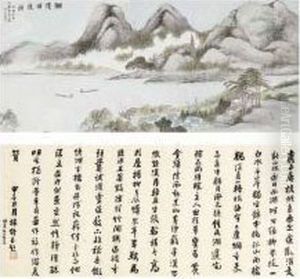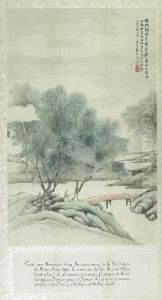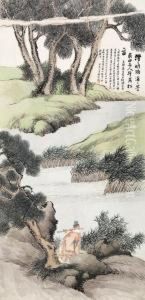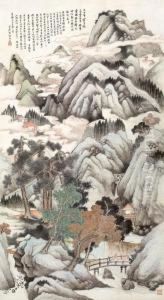Lin Shu Paintings
Lin Shu, born in 1852 in Fuzhou, Fujian Province, China, was a significant figure in the late Qing Dynasty's literary world. Unlike many of his contemporaries who sought to study abroad or embrace Western learning, Lin Shu did not know any foreign language himself. Remarkably, he collaborated with scholars who were versed in Western languages to translate over 180 Western works into Chinese, including classics by Dickens, Stowe, and Hugo. This feat was particularly notable for his use of classical Chinese, making these works accessible to a traditional Chinese audience at a time when the country was grappling with the impact of Westernization and modernization. Lin Shu's translations played a crucial role in introducing Western literature and ideas to Chinese readers, bridging cultural and literary gaps between China and the West during the late 19th and early 20th centuries. Despite his lack of direct knowledge of foreign languages, Lin Shu's intellectual curiosity and dedication to cultural exchange underscored his work. He relied on oral translations and interpretations provided by his assistants, who would explain the content of a work in a Western language, which Lin Shu would then translate into Chinese. This unique method of translation, while criticized by some for inaccuracies, was praised for its fluidity and ability to capture the essence of the original works. Lin Shu's contributions to Chinese literature were not limited to his translations. He was also an accomplished writer, educator, and advocate for the preservation of traditional Chinese literary techniques and values in the face of rapid modernization. His conservative stance on cultural matters, including his skepticism towards the New Culture Movement, which advocated for vernacular Chinese and the abandonment of classical Chinese, placed him at odds with many reform-minded intellectuals of his time. Lin Shu's legacy is complex; he is both celebrated for his monumental role in the cultural exchange between China and the West and critiqued for his conservative views on language and literature. His death in 1924 marked the end of an era but left a lasting impact on Chinese literature and the way it engaged with the world beyond its borders. Lin Shu's life and work encapsulate the tensions and transformations of a China at the crossroads of tradition and modernity.




